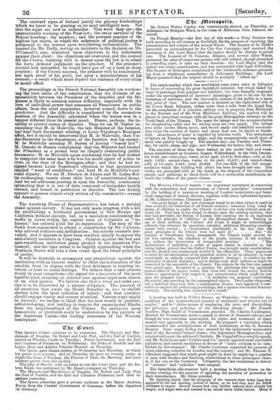The proceedings in the French National Assembly are confirm- ing
the view taken of the constitution, that the division of re- sponsibility between the President of the Republic and the Mi- Mateyo is likely to occasion serious difficulty, especially with the love of individual power that possesses all Frenchmen in public affairs, from the chief magistrate, however named, down to the gendarme. And the difficulty is complicated by the anomalous position of the Assembly, appointed when the nation was in a temper different from its present mood. Hence, perhaps, the in- ability to control scenes of disorder. Thus we see M. Sarrut in- sinuating that M. de Maleville, the late Minister of the Interior, had kept back documents relating to Louis Napoleon's Boulogne affair, lest it should be discovered. that M. de Maleville, then Un- der-Secretary in the department of the Interior, was his enemy ; M. de Maleville accusing M. Sarrut of having "basely lied"; ; M. Dupont de Bussac complaining that the Minister had treated the ?resident as a person bent on illegally abstracting public documents ; M. de Maleville again confessing that he had wished to reappoint the same man who was his secret agent of police in 1840, at the time of the Boulogne affair; and that he had re- signed because Louis Napoleon's objection to that appointment implied"want of confidence," and hurt M. de Maleville's per- sonal dignity. We see M. Drouyn de Lhuys and M. Ledru-Rol- lin exchanging taunts about their love of constitutional forms. And we see addresses pouring in upon the Assembly, courteously intimating that it is out of date, composed of incapables hastily elected, and bound in patriotism to dissolve. The last feeling appears to possess almost every section of the community—except the Assembly.


























 Previous page
Previous page